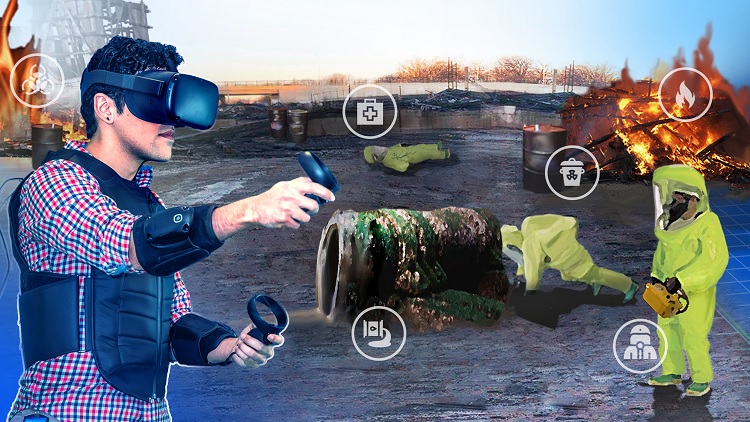
In Virtual Reality News
March 16, 2023 – Charles River Analytics, a developer of intelligent systems solutions, has recently announced that it has been awarded an additional Small Business Innovation Research (SBIR) grant from the National Institute of Environmental Health Sciences (NIEHS) to create virtual reality (VR) modules that enhance training for hazardous waste operations and emergency response (HAZWOPER).
Charles River stated that following a successful Phase I and supplemental COVID-19 grant, it has continued to build VR content to bridge the gap between classroom learning and field exercises.
This latest award is geared towards creating training modules for firefighters, emergency responders, and environmental and industrial workers, who may all encounter hazardous materials. Exposure to these materials poses health and safety risks such as chemical burns, illnesses, fires, and explosions.
Employees who are required to take HAZWOPER training will first attend classroom lectures with slideshow presentations and then do field training exercises. If classroom sessions aren’t engaging or comprehensive, students can be ill-prepared for field training exercises, wasting valuable resources including trainer time and equipment, according to Charles River. Furthermore, students may not retain the information after earning certification, which can put themselves and others in danger when encountering hazardous environments later.
To enhance HAZWOPER training and make it as engaging and effective as possible, Charles River is creating an “Immersive Modular Preparedness Intelligent Tutor” (IMPRINT). The training system includes VR modules in which students can practice the steps to take in hazardous scenarios.
Charles River noted that its software engineers are collaborating with the New England Consortium Health and Safety Training Center via the University of Massachusetts Lowell and the Boston Fire Department to design three-dimensional scenes that match existing course content.
“We’re giving trainers the tools they need to teach people how to safely do jobs that keep our society going during emergencies,” said Dan Duggan, Software Engineer, Extended Reality (XR) Development Lead at Charles River Analytics, and Co-Principal Investigator on the IMPRINT effort.
The Charles River team proved the concept in previous SBIR phases and built relationships with key partners. In Phase II, the company’s XR team is building immersive tabletop simulations using the Meta Quest 2 VR headset, and is creating narratives, sketching maps, selecting 3D assets, and developing game mechanics to complement existing course material and to match HAZWOPER training objectives. Example training scenarios include a 3D scene in which trainees have to determine what to do when they encounter a puddle with a live wire.
Trainees can use IMPRINT to apply complex, dangerous procedures in a safe, controlled virtual environment. A library of VR case studies will replace standard paper and PowerPoint scenario-based activities, and IMPRINT’s immersive tabletop simulations will help to better prepare trainees for both their assessments and responses to real-world safety hazards.
To learn more about Charles River Analytics’ IMPRINT virtual reality training solution, please visit the company’s website.
Image credit: Charles River Analytics
About the author
Sam is the Founder and Managing Editor of Auganix. With a background in research and report writing, he has been covering XR industry news for the past seven years.
